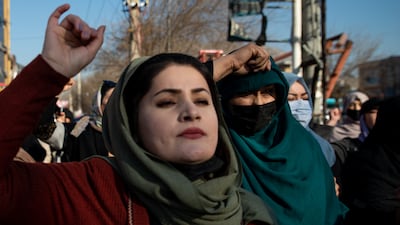Afghanistan's Taliban rulers have said the way female students dressed was one of the reasons behind the decision to bar them from universities.
The Taliban's Acting Higher Education Minister Nida Mohammad Nadim told state television RTA on Thursday that the women "did not observe the Hijab".
"They were wearing clothes mostly worn to go to a wedding," he said.
Other reasons for the ban included a desire to avoid mingling between people of different genders and issues concerning the subjects being taught, the minister said.
“The current curriculum has at least 160 fields,” Mr Nadim said. "There were some fields that were in contrast with the dignity and pride of women and Afghan culture. Engineering and agriculture are part of them."
The ban will be in place "until further notice", he said.
The decision drew international condemnation by countries, rights groups and Afghans all over the world.
"We call on them not to interfere with our internal affairs," Mr Nadim said in response.
'Neither Islamic nor humane'
Turkish Foreign Minister Mevlut Cavusoglu said the ban was "neither Islamic nor humane," in a televised press conference and urged the Taliban to reverse their decision.
Iran also expressed displeasure.
Tehran "regrets" the news and hopes that officials in Afghanistan "quickly pave the way for the resumption of education for female school and university studies at all levels," Foreign Ministry spokesman Nasser Kanani said.
The ban comes less than three months after thousands of girls and young women took university entrance exams across the country, aspiring to continue their education.
The universities are currently on winter break and due to reopen in March.
Most teenage girls across the country have already been barred from attending secondary school education, severely limiting university intake.
Activist Malala Yousafzai was shot by the Pakistan Taliban group, a separate but ideologically affiliated entity, on October 9, 2012.
Her father Ziauddin Yousafzai previously told The National that he has repeatedly challenged the Taliban to find a verse in the Quran that bans women's education.
“If such a thing exists, let me know, and I'll quit my mission and my campaign for women and girls' education, because I'm also a Muslim," he said in an interview on the 10th anniversary of the shooting of his daughter, who survived the assassination attempt and later won the Nobel Peace Prize for her work.
“If you look at the history of Islam, women were independent individuals. They were not confined in four walls. They had a role. They were even fighting wars.”
Lana Nusseibeh, UAE Assistant Minister of Foreign Affairs and International Co-operation and UAE Permanent Representative to the UN said the restrictions on women and girls are "aimed at their erasure from public life".


